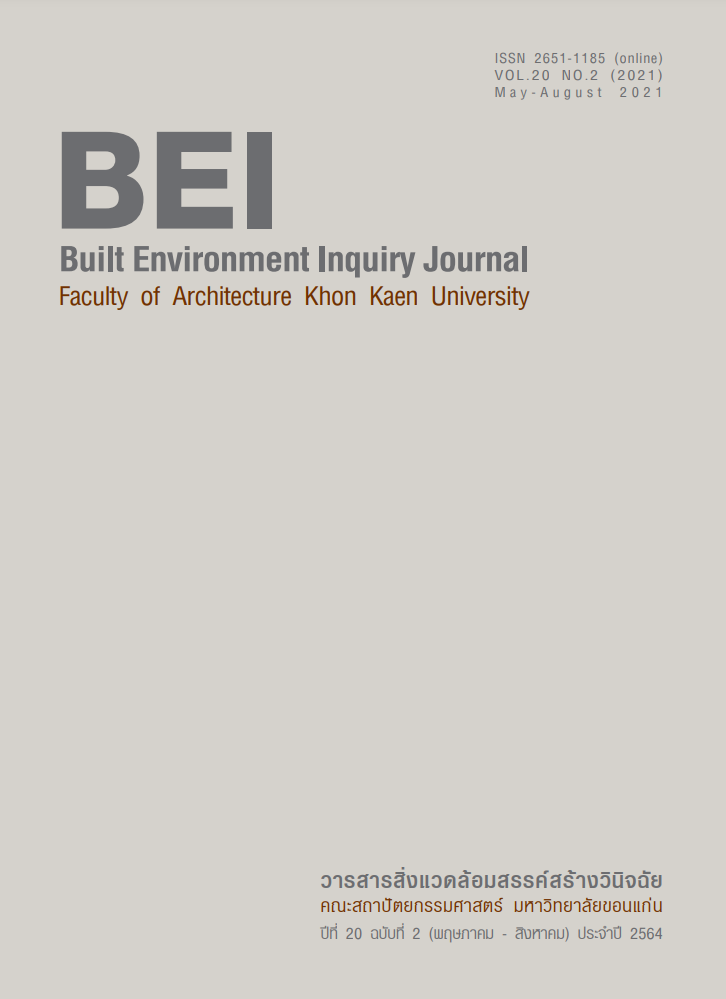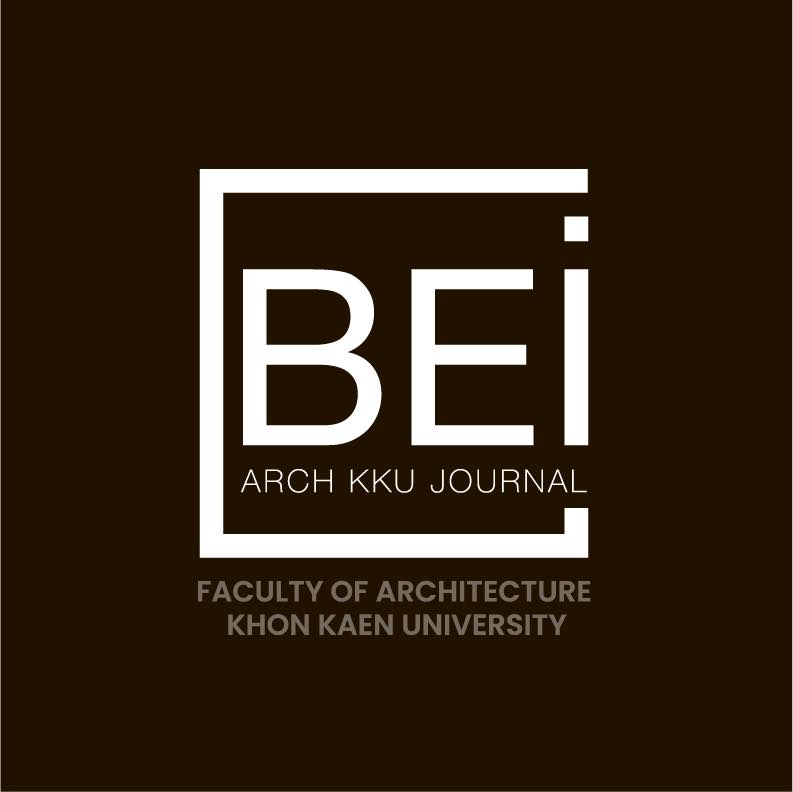‘โครงการกรุงเทพเมืองสีเขียว 2030’: กรณีศึกษาของการกระจายภารกิจสู่การจัดการพื้นที่สาธารณะระดับละแวกบ้านบนที่ดินเอกชน
DOI:
https://doi.org/10.14456/bei.2021.7คำสำคัญ:
พื้นที่สาธารณะบนที่ดินเอกชน, พื้นที่สีเขียวสาธารณะในเขตเมือง, นโยบายสาธารณะท้องถิ่น, กรุงเทพมหานครบทคัดย่อ
โครงการ Green Bangkok 2030 เป็นนโยบายการเพิ่มพื้นที่สีเขียวของกรุงเทพมหานครให้เพิ่มอีกราวร้อยละ 30 ท่ามกลางข้อจำกัดต่างๆ ได้แก่ การจัดหาที่ดิน การดูแลรักษา ตลอดจนการสร้างพลวัตของกิจกรรมในพื้นที่ คณะผู้ศึกษาได้ศึกษาแนวทางการเพิ่มพื้นที่สีเขียวและพื้นที่สาธารณะตามนโยบายดังกล่าวผ่านการใช้กลไกสมัชชาสุขภาพแห่งชาติ และการสร้างบทสนทนาทางด้านนโยบาย (Policy Dialogue) ระว่างหน่วยงานรัฐ ภาคประชาสังคม ชุมชน และภาคเอกชน ตั้งแต่ปี. พ.ศ. 2561 ซึ่งเงื่อนไขหนึ่งของการเพิ่มพื้นที่สีเขียวสาธารณะให้เพิ่มมากขึ้นได้ จำต้องอาศัยความร่วมมือจากภาคเอกชน งานศึกษาชิ้นนี้จึงเน้นการศึกษาผ่านปฏิบัติการในพื้นที่สีเขียวสาธารณะระดับละแวกบ้าน 2 แห่ง เพื่อสะท้อนความเป็นไปได้ในการเพิ่มพื้นที่สีเขียวสาธารณะโดยใช้พื้นที่เอกชน (Privately-owned Public Space) โดยมีโจทย์สำคัญ 2 ด้าน คือ 1) อะไรคือเงื่อนไขให้เอกชนและชุมชนเข้ามามีส่วนสร้าง จัดการ และดูแลพื้นที่สีเขียวสาธารณะควบคู่ไปกับกรุงเทพมหานคร 2) ความเป็นไปได้ในการออกแบบกลไกการบริหารจัดการพื้นที่สามารถเกิดขึ้นได้อย่างไรบ้าง คณะศึกษาพบเงื่อนไขที่ภาคเอกชนใความสนใจในการอุทิศที่ดินเอกชนให้ใช้ในระยะยาวเพื่อเป็นพื้นที่สีเขียวพื้นที่สาธารณะ ประกอบด้วย การเปลี่ยนแปลงของนโยบายภาษีที่ดิน และการสร้างโจทย์ที่ดีเพื่อคุณภาพของพื้นที่สีเขียวสาธารณะ และพบว่า กรุงเทพมหานครยังขาดกลไกในการจัดการพื้นที่สาธารณะที่นอกเหนือไปจากการจัดการจากหน่วยงานรัฐแบบเบ็ดเสร็จ ซึ่งอาจส่งผลให้เกิดภาระด้านงบประมาณที่ไม่สามารถเพิ่มจำนวนให้บรรลุ ตลอดจนรักษาคุณภาพพื้นที่สีเขียวสาธารณะให้สนองตอบต่อความต้องการของคนเมืองได้ อย่างไรก็ตามก็เริมเห็นความเป็นไปได้ใหม่ๆ ในการสร้างกลไกให้เกิดการบริหารจัดการร่วมกันระหว่าง รัฐ ชุมชน และภาคเอกชน ในรูปแบบคณะกรรมการร่วม 3 ฝ่าย
เอกสารอ้างอิง
Carmona, M. and Megalhaes, C.D. (2006). Public Space Management: Present and Potential.
Journal of Environmental Planning and Management 49(1): 75-99.
Dimmer, C. (eds.) (2013). Privately Owned Public Space: The International Perspective |
Sustainable Urban Regeneration Series 25, Tokyo: Center for Sustainable Urban
Regeneration, The University of Tokyo.
Dollinger, M. et al. (2019). Working Together in Learning Analytics Towards the Co-Creation of
Value. Journal of Learning Analytics 6(2): 10-26.
Hass, T. and Mehaffy, M.W. (2019). Introduction: The Future of Public Space. Urban Design
International 24: 1-3.
Kongphunphin,C. and Iamtrakul, P. (2020).A Classification of Thai Urban Public Spaces: A Case of
Bangkok Mertropolitan Area, Thailand. Journal of Architecture/Planning Research and
Studies 17(2): 41-58.
Leclercq, E. (2018). Privatisation of the Production of Public Space. Delft: Architecture and the
Built Environment, Delft University.
Mierzejewska, L. (2011). Appropriation of Public Urban Spaces as an Effect of Privatisation and
Globalisation. Quaestiones Geographicae 30(4): 39-46.
Nasution, A.D. and Zahrah, W. (2012) Public Open Space Privatization and Quality of Life, Case
Study Merdeka Square Medan. Procedia - Social and Behavioral Sciences 36: 466-475.
Nasution, A.D. and Zahrah, W. (2015). The Space is Not Ours, the Life of Public Open Space in
Gated Community in Medan, Indonesia. Procedia - Social and Behavioral Sciences 202:
-151.
Nasution, A.D. and Zahrah, W. (2017). Privately-Owned Public Space for Public Use. Asian Journal
of Quality of Life 2(7): 11-19.
Németh, J. (2009). Defining a Public: The Management of Privately Owned Public Space. Urban
Studies 46(11): 2463-2490.
Németh, J. (2012). Controlling the Commons: How Public is Public Space?. Urban Affairs Review
(6): 811-835.
Németh, J. and Schmidt, S. (2011). The Privatization of Public Space: Modeling and Measuring
Publicness. Environment and Planning B: Planning and Design 38: 5-23.
Nissen, S. (2008). Urban Transformation: From Public and Private Space to Spaces of Hybrid
Character. Czech Sociological Review 44 (6): 1129-1149.
Reyes, R.C. (2016). Public Space as Contested Space: The Battle over the Use, Meaning and
Function of Public Space. International Journal of Social Science and Humanity 6(3):
-207.
Sahakian, M. et.al. (2020). Green Public Spaces in the Cities of South and Southeast Asia:
Protecting Needs towards Sustainable Well-Being. The Journal of Public Space 5(2):
-110.
Sijbandij, J. (2018). The Privatisation of Public Space in Amsterdam: Divergent Perception of
Public and Private Sector Actors. Unpublished Master Thesis in Urban and Regional
Planning, University of Amsterdam.
Tang, K. (2018). Privatization of Public Space: Spatial Practice in the Umbrella Movement. Space
and Culture 22(4): 449-459.
Usavagovitwong, N. (2019). Co-Creating Public Space: Attitude, Process, and Opportunity. The
Architectural Journal of the Association of Siamese Architects under Patronage 1:
-81.
ฐานข้อมูลอิเล็คทรอนิกส์
Active, The. (2021). คลองสาน สานมือ ร่วมสานเมือง : จากประวัติศาสตร์สู่อนาคตกาล, Retrieved from
https://theactive.net/read/klongsan-together-shape-urban-future/
Citycracker. (2021). Seven Perspectives in Creating Public Space, ‘Crack City for Public Space
Seminar’. Retrieved from https://citycracker.co/city-crack/city-event/crackcityforpublicspace/
Cloud, The. (2020) Retrieved from https://readthecloud.co/hua-lampong-temple-park/
Cloud, The. (2021) The Cloud x we!park. Retrieved from https://readthecloud.co/hua-lampongtemple-
park/
National Health Assembly (2018) การพัฒนาพื้นที่สาธารณะเพื่อสุขภาวะและการพัฒนาอย่างยั่งยืน: เขตเมือง.
Retrieved from https://www.nationalhealth.or.th/_external/210861_เอกสารหลัก_PS up.pdf
Lee, D. (2020). Whose Space is Privately Owned Public Space? Exclusion, Underuse and the Lack
of Knowledge and Awareness. Urban Research & Practice. doi:10.1080/17535069.2020.1
Standard, the (2020) กทม. ตั้งเป้าเพิ่มพื้นที่สีเขียวให้คนกรุง 10 ตร.ม./คน ภายใต้โครงการ Green Bangkok
Retrieved from https://thestandard.co/green-bangkok-2030/
ดาวน์โหลด
เผยแพร่แล้ว
รูปแบบการอ้างอิง
ฉบับ
ประเภทบทความ
สัญญาอนุญาต
ทัศนะและข้อคิดเห็นของบทความที่ปรากฏในวารสารฉบับนี้เป็นของผู้เขียนแต่ละท่าน ไม่ถือว่าเป็นทัศนะและความรับผิดชอบของกองบรรณาธิการ




